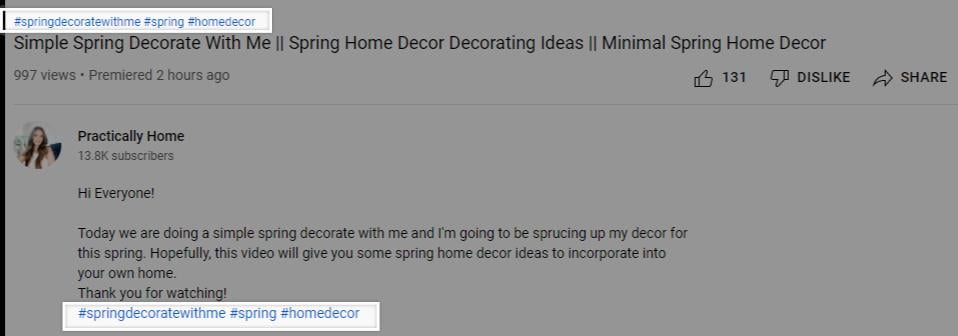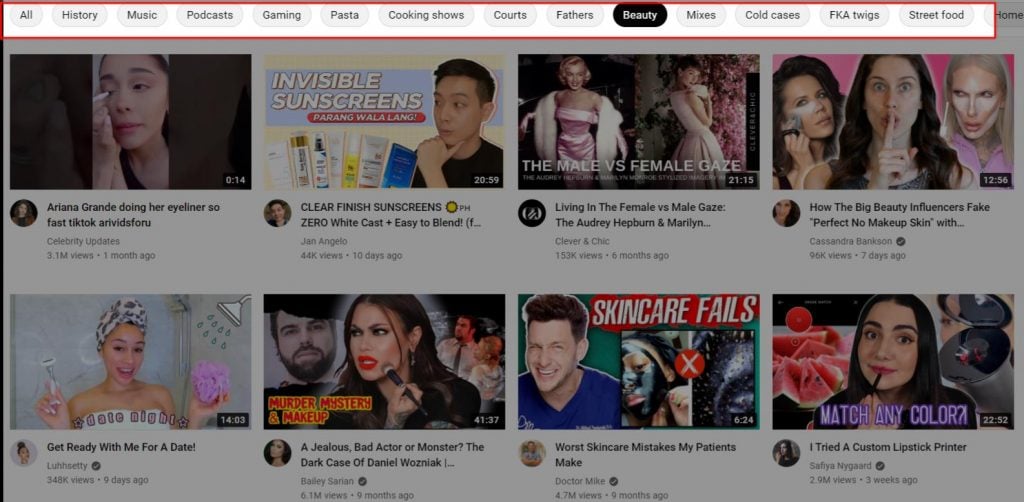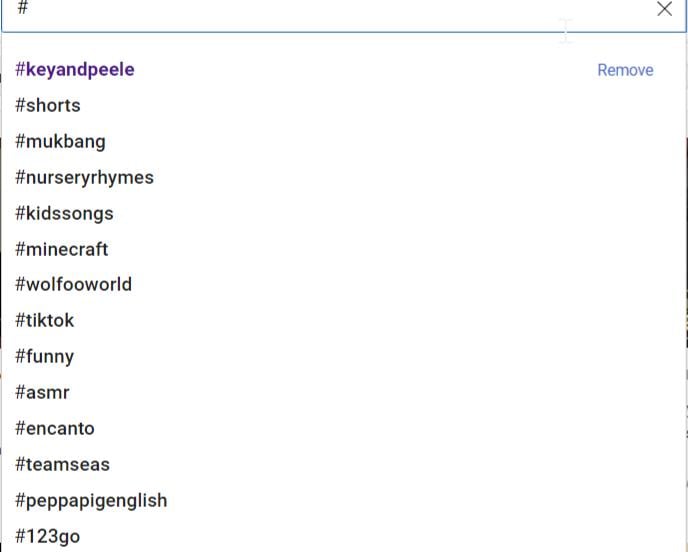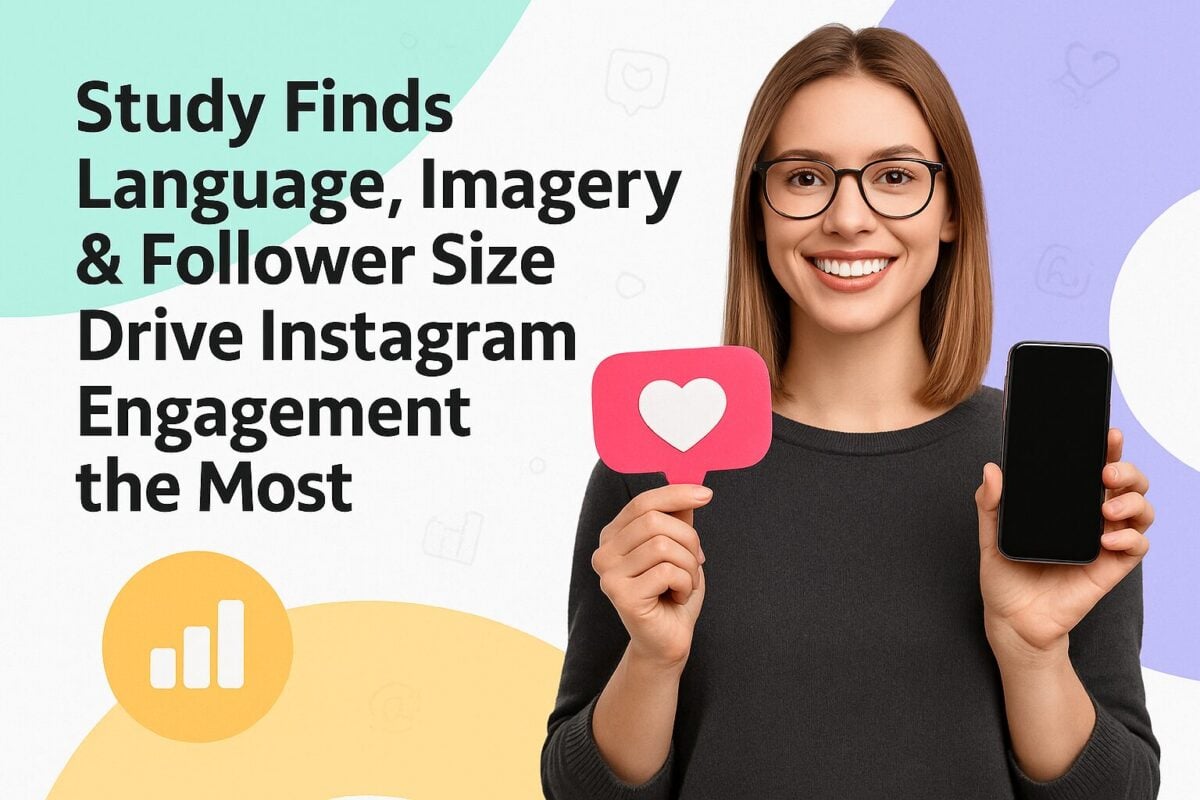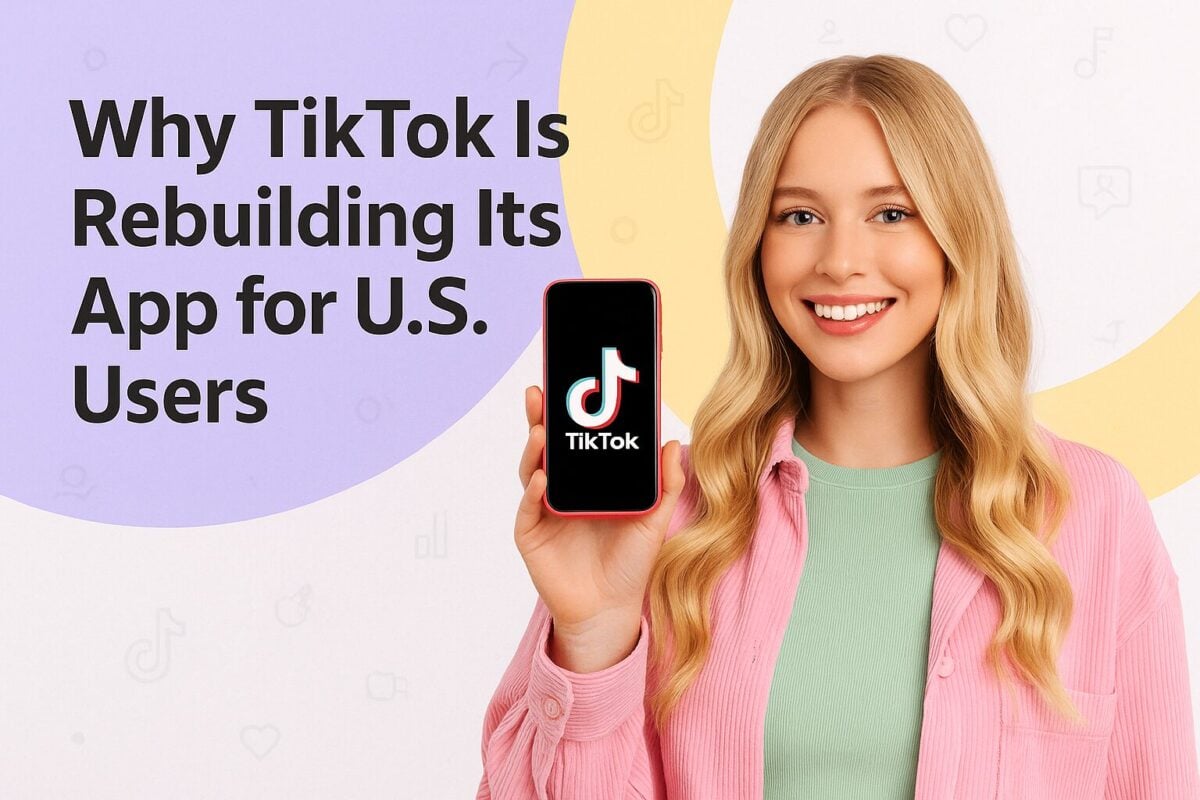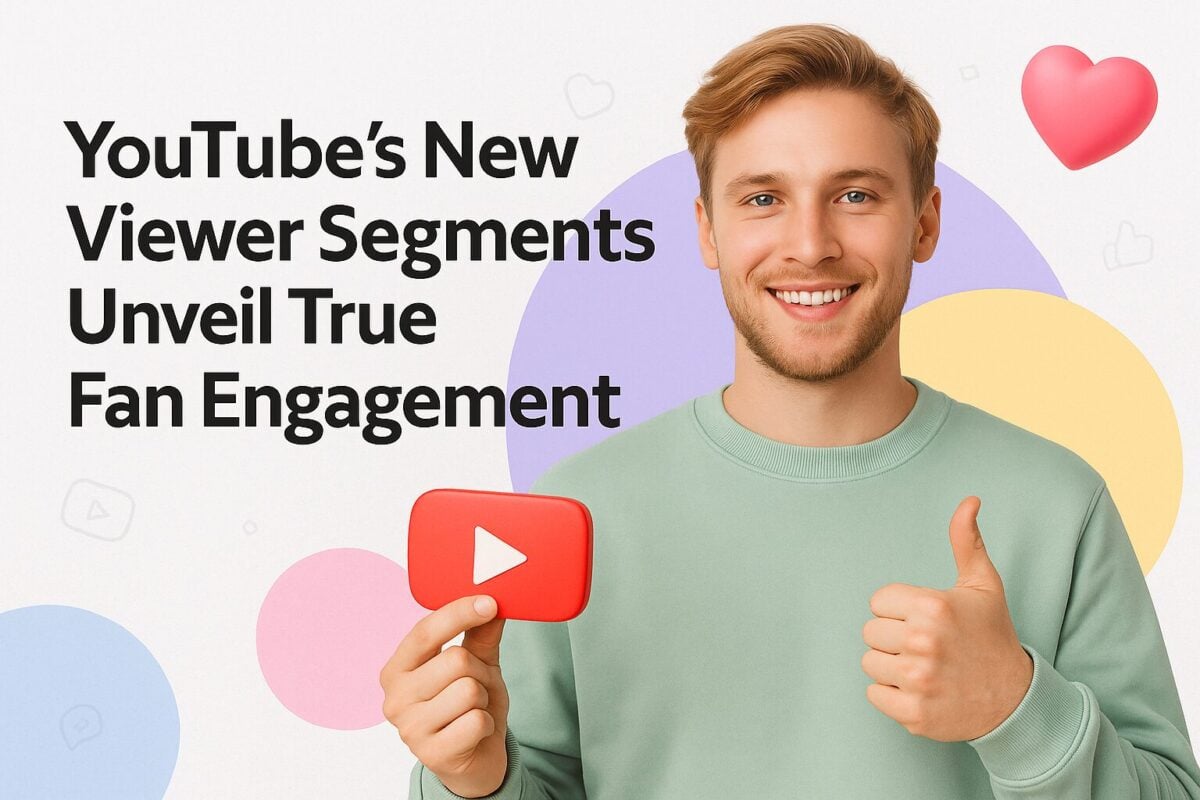Hashtags are to social media what keywords are to Google. They help to categorize content so users can easily find what they’re looking for. While the use of hashtags has been typically associated with Twitter and Instagram, those aren’t the only platforms where you can use them. In fact, using hashtags on YouTube could be your ticket to increased viewership and subscriber growth.
![]()
Video total
Most recent video
Subscribers growth
Avg engagements per video
Reactions
Comments
Estim. earnings per video
This post explores the topic of YouTube hashtags, why you should use them, how you can use them, and what rules you should follow. Let’s find out.
What Are YouTube Hashtags?
YouTube hashtags are keywords or phrases preceded by the hash (#) symbol. Adding this symbol makes the word or phrase clickable, so users can easily search for related videos tagged with the hashtag. It also enables content creators on the platform to categorize their videos with other content that uses the same hashtag.
Users can also conduct a search using the hashtag from the YouTube search bar.
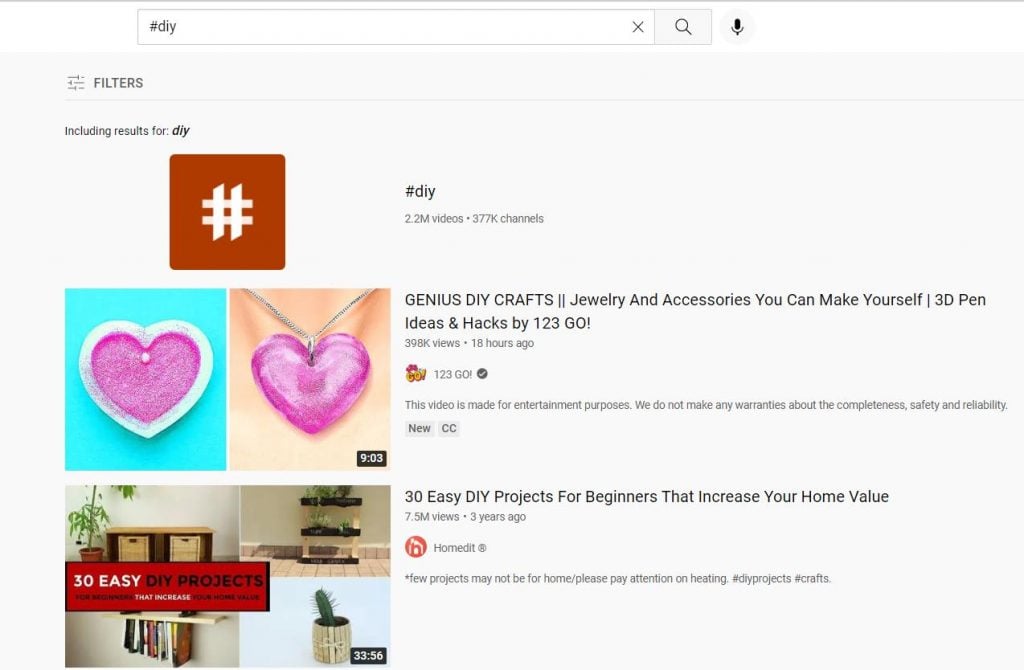
Source: youtube.com
And in the above example, clicking on the #diy tag at the top of the search results will give you a whole bunch of videos related to the hashtag. From here, you can browse some of the most popular videos that are tagged with the #diy hashtag.
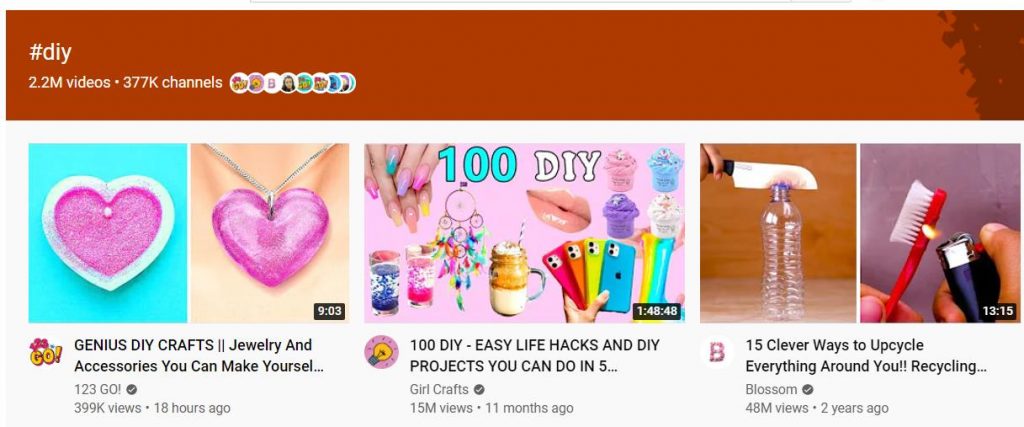
Source: youtube.com
Why You Should Use Hashtags on YouTube
Hashtags are a great way to help YouTube understand the context and content of your videos. This means that the platform will associate your videos with similar content or content that explores the same topic. So when users conduct a search using the hashtag, they can discover all the various videos that are sorted under the tag. As a result, hashtags help to boost your content discoverability on the platform and promote your channel for free.
For example, if you look at the video description below, you can see tags like #gaming and #minecraft. This helps YouTube to understand that the video is about Minecraft and is related to gaming.
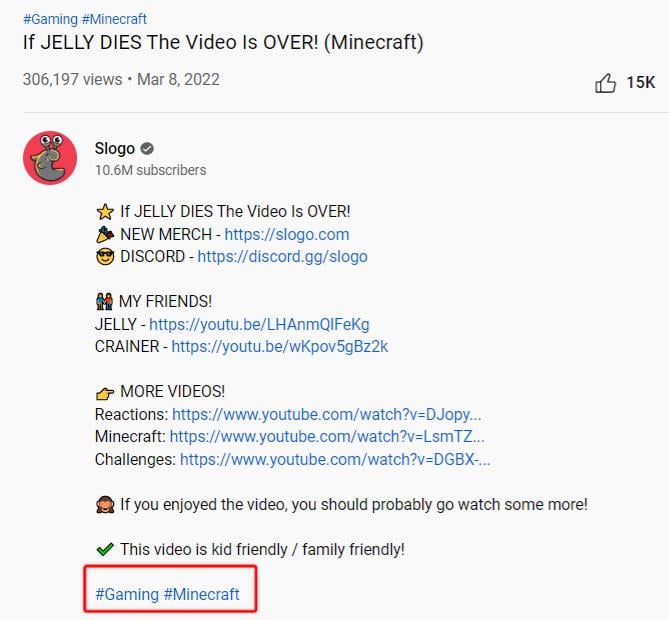
Source: youtube.com
And if you search for the #minecraft hashtag, you can also see that the video shows up as one of the top search results. The fact that the video is from a large YouTube account helps with the ranking. But the hashtag ensures that it shows up in this specific search result.
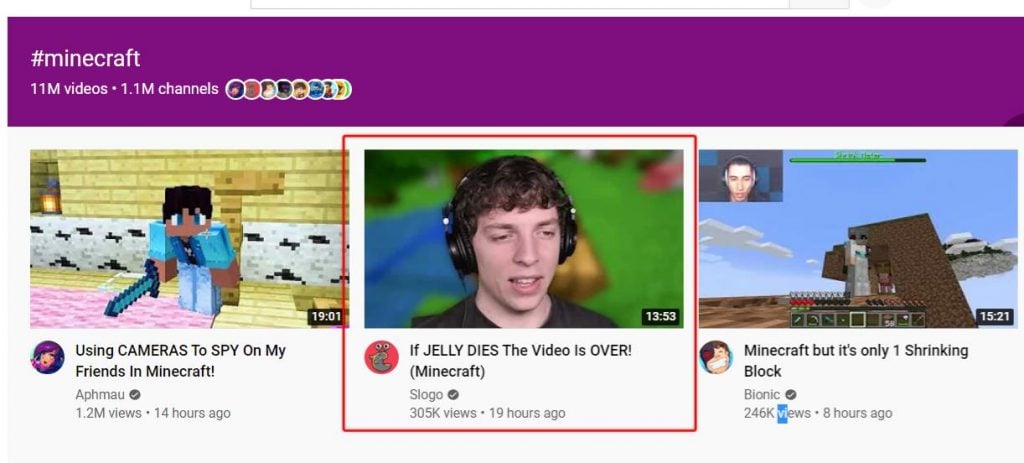
Source: youtube.com
The easier it is to find your videos, the better your chances of attracting viewers. More viewership also drives up your ranking in relevant search results and in the YouTube algorithm. And with more people seeing your videos, you could eventually drive subscribership for your YouTube channel.
In other words, using YouTube hashtags could help you subsequently grow your YouTube channel, which makes them extremely important for brands, marketers, and content creators alike. This makes it a critical part of your YouTube SEO strategy.
How to Include Hashtags to Your YouTube Videos
YouTube lets you include hashtags to your videos while uploading them. This can be done when you’re updating the details of your video. There are two places where you can add hashtags on YouTube–in the video title and in the description.
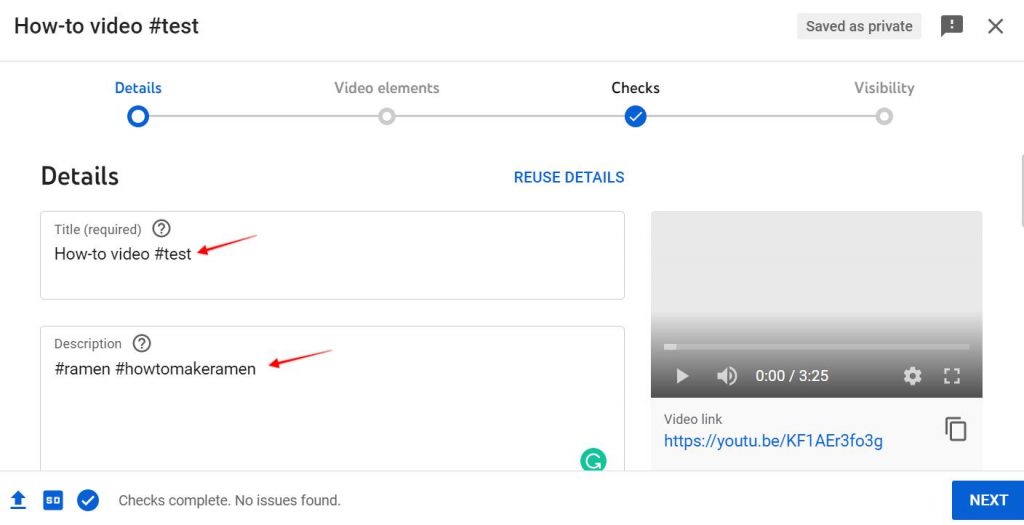
Source: youtube.com
If you add hashtags to the video title, they will appear in the title itself. Just like any other hashtag, the hashtags in your title will be highlighted in blue to show that it’s clickable. Here’s an example:
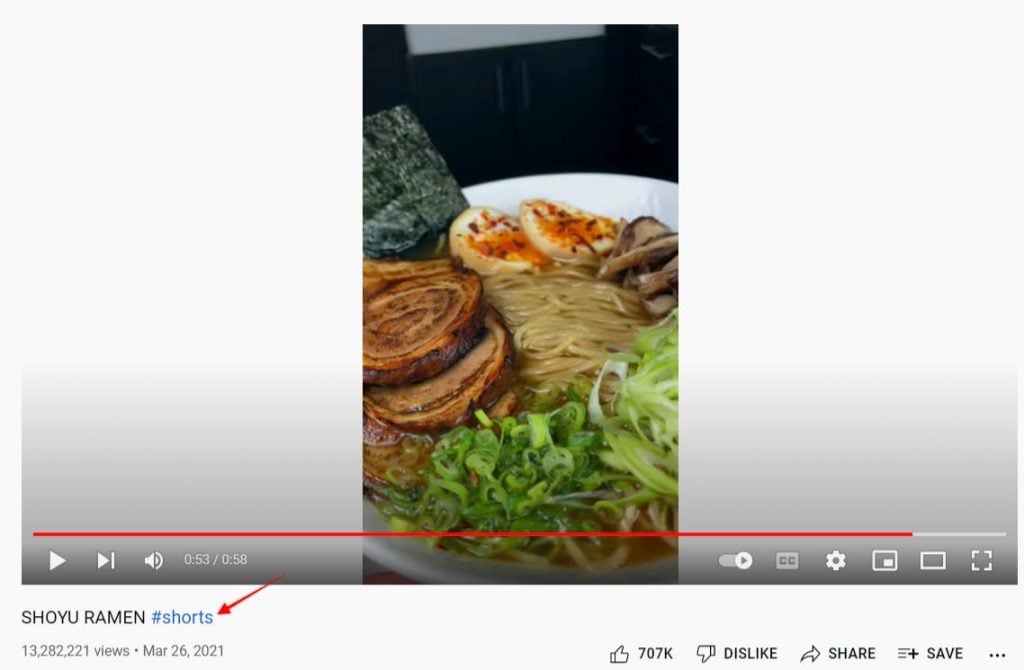
Source: youtube.com
If you add hashtags in your video description, they will appear in two places. For starters, they will appear within the description itself like this:
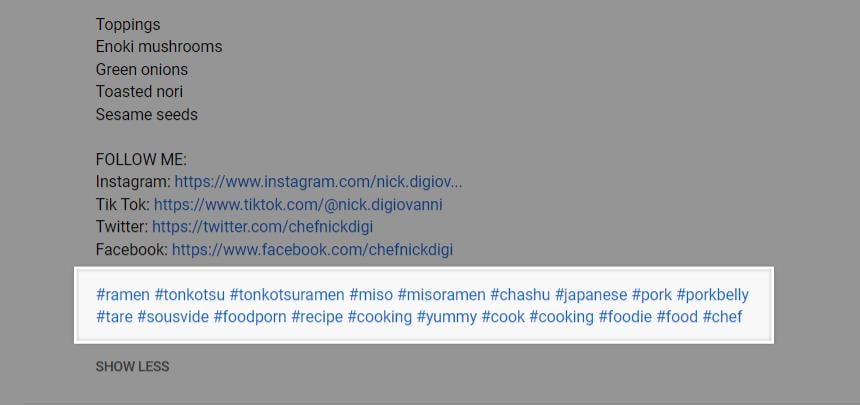
Source: youtube.com
Plus, the first three hashtags you use will also show up at the top of your video title. Here’s an example:

Source: youtube.com
YouTube Hashtag Rules to Follow
YouTube has a few rules in place for using hashtags on the platform. Just like the videos you upload on YouTube, the hashtags you use must follow the platform’s Community Guidelines. If your hashtags violate these policies, they won’t be displayed under your video title and may even be removed. When using hashtags on YouTube, make sure you follow the rules below:
- Don’t add spaces in between words unless you want to create two separate hashtags. For example, if you want to turn the phrase “one hashtag” into a single hashtag, you should write it as #onehashtag instead of #one hashtag or #one #hashtag. See how “spring-decorate with me” and “home décor” are all written without spaces between the words in the following video.
Source: youtube.com
- Avoid adding too many hashtags in one video. This makes your video less relevant to the viewers who are searching for specific hashtags. Moreover, YouTube will ignore all the hashtags in your video if you use more than 60.
- Avoid including hashtags that aren’t directly related to the video. YouTube may remove your video altogether if you tag it with unrelated or misleading hashtags.
- YouTube prohibits users from including hashtags that are intended to harass, threaten, humiliate, intimidate, or expose an individual or a group.
- YouTube also prohibits users from including hashtags that promote hatred or violence against an individual or a group. This may include hashtags containing racist or sexist language or other slurs.
- Hashtags containing sexual or explicit language, profanity, and offensive terms are also prohibited by YouTube.
- Avoid including ordinary descriptive hashtags or hashtags that contain repetitive sentences.
How to Find the Best YouTube Hashtags to Use
Remember that you’re not just adding YouTube hashtags for decoration. You’re using them to improve the discoverability of your videos and hopefully attract viewers and subscribers. So it’s crucial that you carefully look for relevant hashtags that you can use in your videos. Here are some practical tips to help you out:
Get Inspiration from Trending/Popular Videos
Videos that are already gaining tons of visibility can guide your YouTube hashtag strategy. Since those videos are ranking, it shows that whatever hashtags they’re using has some sort of impact. So leveraging those same hashtags could also help you improve your content visibility.
While you can look at the videos in the “Trending” section, chances are most of those videos won’t be related to your content at all. Instead, choose from one of the suggested topics at the top of your YouTube homepage.
These topics are suggested based on your viewing history and interests, which makes them more likely to be relevant to your content than what is on the Trending page. YouTube will provide a recommendation of the most popular videos that are relevant to each topic. Go through these videos to see what hashtags they’re using that you could use for your own videos.
Keep in mind that some of the videos may not have any hashtags at all, especially if they’re coming from large YouTube accounts. You just have to find the ones that do and see which of the hashtags are applicable for you. For example, one of the videos above uses hashtags like #BeYOUTiful, #skincare, and #skinfluencer. While #BeYOUTiful may be more specific to the channel’s community, tags like #skincare and #skinfluencer may be great options for a skincare-related YouTube video.
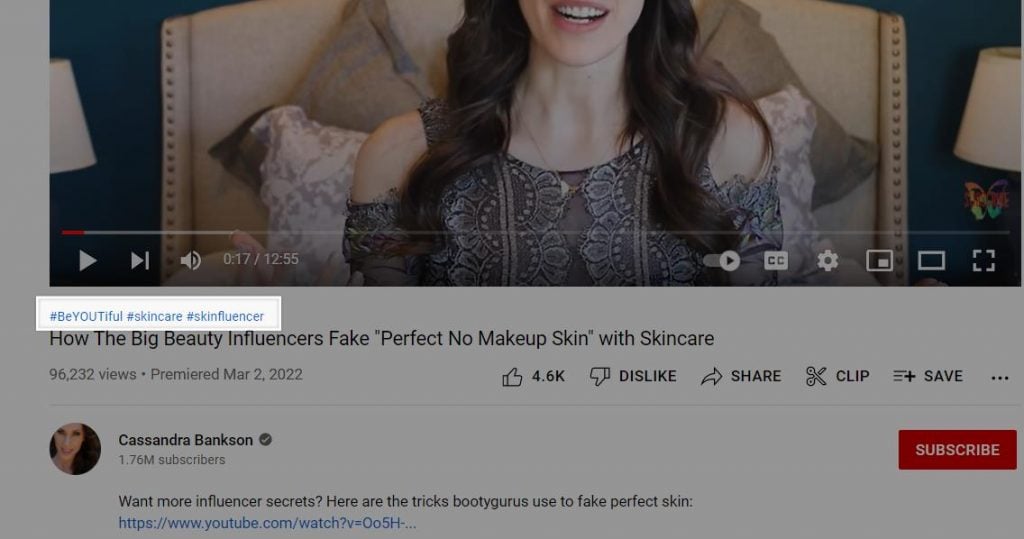
Source: youtube.com
Get Inspiration from Your Competitors
Your top competitors are the biggest source of inspiration for relevant YouTube hashtags. First of all, they’re focusing on the same types of topics as you. Plus, they might have plenty of videos for which they’ve garnered tons of views and engagement. Now you just have to find what hashtags they’re using for those top-performing videos that you can use for your own videos.
Go to the “Videos” section on your competitor’s YouTube channel. Then click on the “Sort by” button and select “Most popular” to key in on videos that received tons of views.

Source: youtube.com
Next, you can go through the top videos to see what hashtags they’re using and if those hashtags would be relevant for your own videos. (Pro Tip: This tactic can also be used to inform your YouTube content strategy as it helps you discover the types of content that are working for your competitors.)
Make the Most of YouTube’s Auto-Suggest
Another great option is to get ideas from YouTube’s auto-suggest. Type in the “#” symbol into the search bar and you’ll find hashtags that are currently searched for most frequently on the platform. See if there’s anything that you can use in your videos to improve the chances of getting discovered using one of these trending hashtags.
Use a YouTube Hashtag Generator
You can also save time by using a hashtag generator tool to automatically discover the most popular and relevant hashtags for your content. Keywordtool.io and vidIQ are some hashtag generator tools that can help you find hashtags specific to YouTube.
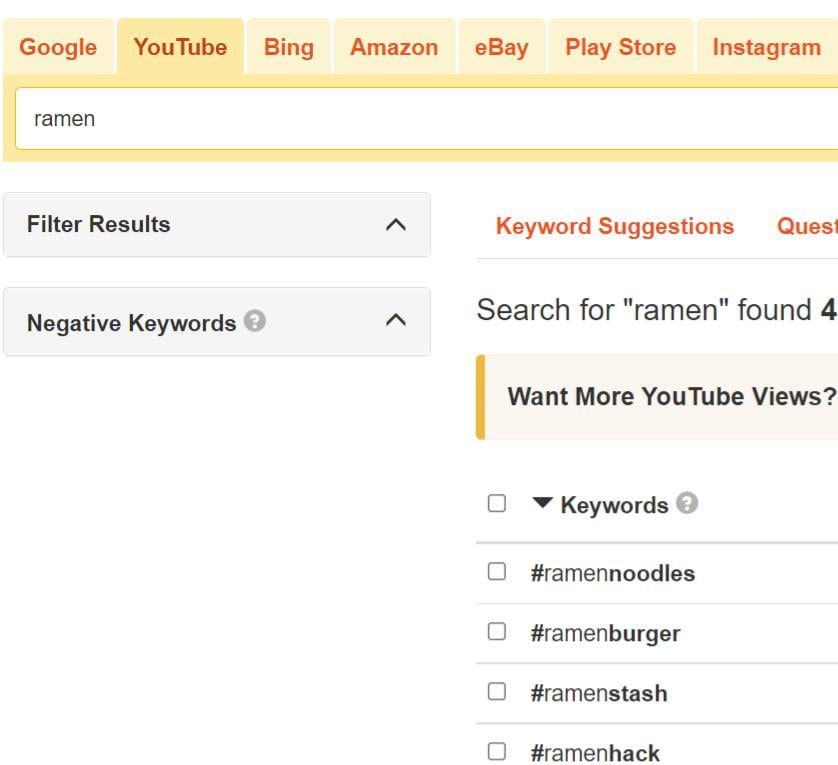
Source: keywordtool.io
And the best part is that these tools won’t just give you hashtag suggestions but they’ll also justify why those hashtags are suggested. This means they’ll include data about each hashtag such as search volume, trend, and competition. So much like how you choose the best keywords to use for SEO, you can make an informed decision about the best hashtags to use in your YouTube videos.
Best Practices to Using Hashtags on YouTube
Considering all the rules that YouTube has in place, it’s obvious that you should carefully plan out your YouTube hashtag strategy instead of just copy-pasting whatever hashtags you want to use. Otherwise, your videos might not show up at all even in the search results for hashtags that you’re using. From using hashtags in moderation to using a branded hashtag–here are some best practices to follow when using hashtags on YouTube:
Only Use the Most Relevant Hashtags
As mentioned in the “rules” section, YouTube doesn’t recommend using hashtags that aren’t directly related to the content of your video. That means you can’t just use whatever trending hashtag that you see if it doesn’t align with what’s discussed in the video. Otherwise, YouTube might find you in violation of their Misleading Metadata Policy, which could end up in your video getting removed altogether.
For example, it may be relevant to use the hashtag #gadget in a video about a lipstick printer. However, that doesn’t mean it’s the right hashtag to use in a video about regular makeup tools like a foundation brush or a lip brush.
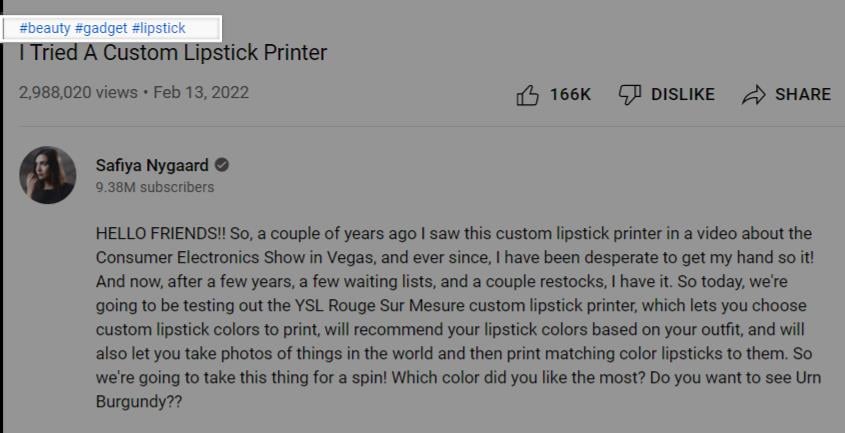
Source: youtube.com
Make the most of the hashtag generator tools shared above to enter a keyword related to your content and get suggestions on highly relevant and popular hashtags that you can use. This will not only improve your chances of getting the video in front of the right audience, but it’ll also ensure that you’re in compliance with YouTube’s policies.
Avoid Overusing YouTube Hashtags
There’s such a thing as “too much,” especially when it comes to keywords and hashtags. Just like you can overstuff your website content with keywords, you can overstuff your YouTube videos with hashtags. This is something that should be avoided at all costs, especially since YouTube specified that they’ll completely ignore videos that use more than 60 hashtags.
With that said, that doesn’t mean you should use up all of those 60 hashtags. Remember how we said that your videos become less relevant the more hashtags you add? So if you want your videos to show up in relevant hashtag searches, you should focus on just a handful of the best ones. Ideally, keep it between two and four so your description space looks clean and easy to process.
See how the following video from CreativeLife only uses about six hashtags. Each of the hashtags is very relevant to the topic of the video i.e. how to make a portable AC at home. The video may be a few years old but it still shows up as one of the top results for #howtomake because it’s considered highly relevant by YouTube.
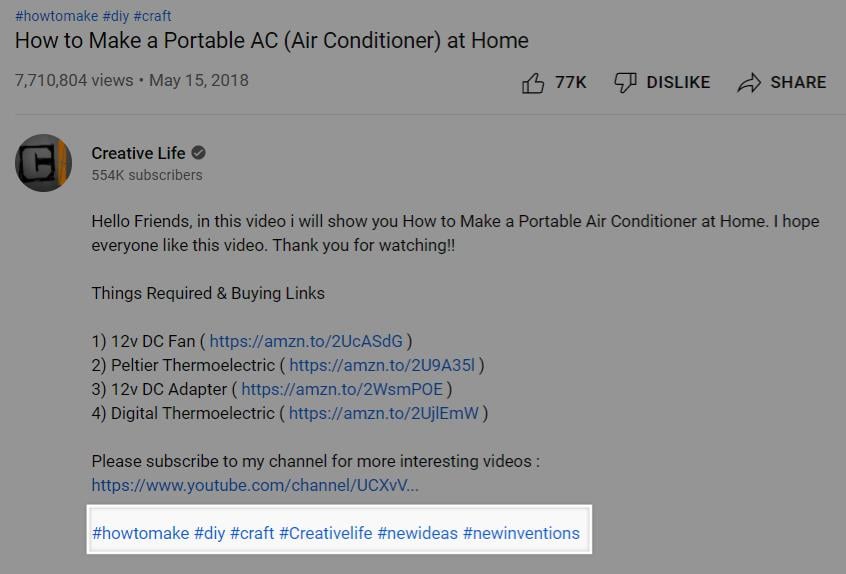
Source: youtube.com
Create a Branded Hashtag
One major risk of using hashtags (even the right ones) is that viewers may be tempted to click on the hashtags at the top of your title and away from your video. This will lead them to related videos from other YouTube channels, meaning that you’re losing viewership. A good workaround for this is by creating a branded hashtag.
Branded hashtags are hashtags that include your brand or product name, which makes them highly specific to your channel. This is applicable for both businesses and content creators alike, with YouTubers having the option to create hashtags with their channel name or community name. So when viewers click on these branded hashtags, they’ll get to see all sorts of videos from your channel.
That means although they’re clicking away from the original video, they’ll still be engaging with other videos from your channel. This is likely to get them hooked to your channel and even convince them to become subscribers. See how the Absolute History channel uses #AbsoluteHistory as the first hashtag in their video.
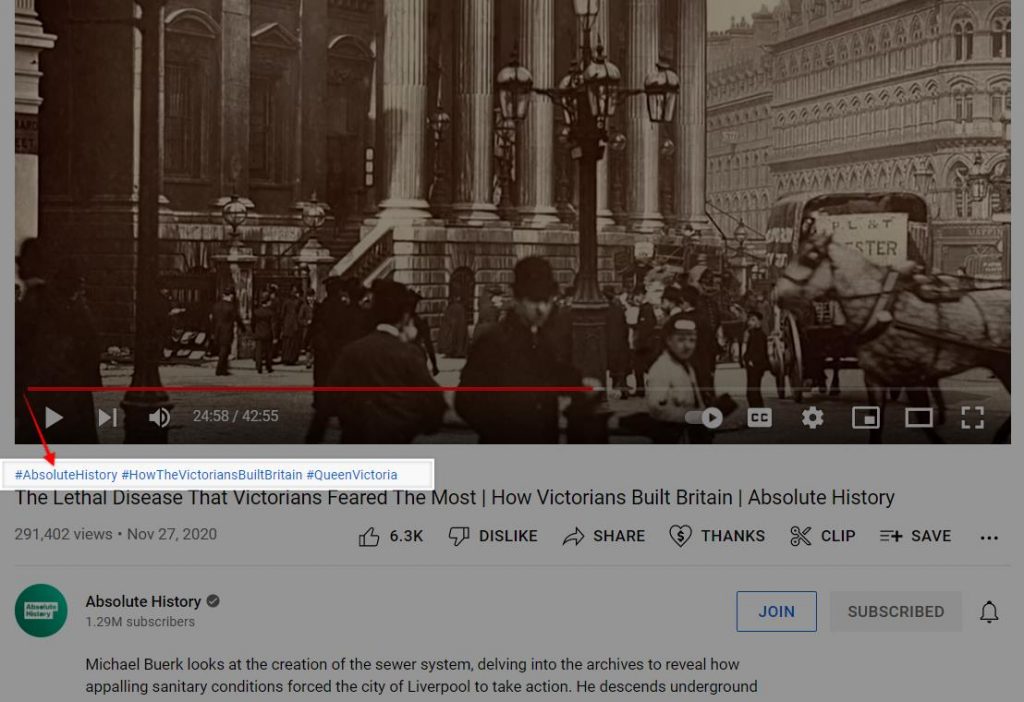
Source: youtube.com
Gearing Up for YouTube Growth
With the right approach, YouTube hashtags are an excellent way to boost your content discoverability on the platform, attract more viewers, and subsequently turn them into subscribers. Make the most of this guide to develop a robust YouTube hashtag strategy and watch your channel grow.
Frequently Asked Questions
Do hashtags work on YouTube?
YouTube has said that hashtags can help improve your video’s discoverability on YouTube. Hashtags on YouTube work similar to other social media platforms. When you click on the hashtag, it takes you to a list of posts with that same hashtag.
Which hashtag is best for YouTube?
The most popular hashtags to use on YouTube include #youtubeislife #subscriber #youtubeguru #youtubecontent #newvideo #subscribers #youtubevideo #youtub #youtuber and #youtubevideos . Use these hashtags in your Instagram, YouTube, or TikTok posts to boost your views.
How do I promote my YouTube video?
Try these popular, proven tips to promote your YouTube channel:
- Engaging titles
- Optimize your videos for visibility
- Customize thumbnails
- Cross-promote videos
- Target Google search results
- Run contests and giveaways
How do you make a viral short on YouTube?
To make a viral short on YouTube, follow these easy steps:
- Sign into YouTube
- Click create
- Film your short: it should be no more than 60 seconds.
- To record the clip, hold the capture button or tap the button to start - and then to stop
- Post the short
How do I grow my YouTube channel?
To grow your YouTube channel, follow these proven tips:
- Focus on a single keyword or topic
- Reuse top performing content
- Brand your content
- Cross promote
- Stand out with personality
- Post catchy titles and thumbnails
- Push for subscriptions
